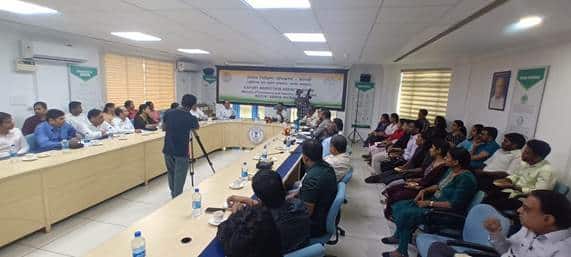EIC has evolved as a key facilitator of India’s export trade and quality
Strengthening India's Export Standards: The Role of EIC

The Export Inspection Council of India (EIC) plays a vital role in ensuring the quality of Indian exports. Established under the Export (Quality Control and Inspection) Act of 1963, the EIC advises the government on quality control and pre-shipment inspection standards. Over the years, it has evolved into a key facilitator of India’s export trade. The EIC helps exporters meet the stringent quality demands of international markets, thereby enhancing India’s reputation as a reliable trade partner.
The Scope of EIC’s Responsibilities
The EIC is responsible for a wide range of food product categories. These include fish, milk, eggs, honey, basmati and non-basmati rice, fruits and vegetables, poultry, processed meat, and peanuts. Additionally, it oversees animal products such as gelatin, ossein, bones, and animal casings. The EIC also manages feed additives and pre-mixtures, along with nutraceuticals containing botanicals and salt. This comprehensive oversight ensures that all exported food products meet international quality standards.
To celebrate the anniversary of the Export (Quality Control and Inspection) Act, the EIC organized three media outreach programs in Kochi, Mumbai, and Vishakhapatnam. These events featured experts who shared their knowledge and engaged in interactive sessions with exporters. Such initiatives not only promote awareness but also foster collaboration between the EIC and the exporting community. By facilitating discussions on quality control and inspection standards, the EIC aims to strengthen the overall export ecosystem in India.
Infrastructure Development and Capacity Building
In recent years, the EIC has made significant strides in enhancing its laboratory ecosystem. The number of recognized laboratories has increased from 21 in 2013-14 to 78 in 2024-25. This expansion is crucial for timely testing and facilitating exports. The EIC’s approach focuses on developing the capabilities of export establishments and promoting a robust Food Safety Management System. This system instills confidence among importing countries regarding the quality of Indian products.
The number of approved export establishments has also seen remarkable growth. From 794 in 2013-14, the number surged to 1,446 in 2023-24, marking an impressive 82% increase. The EIC has organized 653 training programs over the past decade, targeting stakeholders in laboratory testing, quality management, and food safety systems. Additionally, the International Training Centre for Food Safety and Applied Nutrition (ITCFSAN) in Mumbai has conducted over 100 training sessions since 2019, benefiting more than 6,000 personnel, including food business operators and regulators.
Enhancing International Trust and Certification
The EIC has built trust with international regulatory authorities through effective official control systems. This trust is reflected in the number of export certificates accepted by importing countries, which has grown from 61,000 in 2013-14 to over 120,000 in 2023-24. This nearly doubling of certificates issued demonstrates the EIC’s commitment to maintaining high-quality standards.
The EIC’s certification system is recognized by major international regulatory bodies, including those in the European Union, USA, Australia, and Japan. This recognition underscores the EIC’s dedication to international quality benchmarks. The EIC actively participates in global forums such as Codex Alimentarius, ISO, and WTO, which helps advance science-based standards. These efforts reduce trade barriers and foster seamless international trade, benefiting Indian exporters.
Future Initiatives and Technological Advancements
Looking ahead, the EIC plans to launch a user-friendly integrated online portal. This portal will streamline the processes involved in inspection, testing, and certification for exports. The EIC aims to adopt advanced technologies, including IoT-based sampling techniques, to enhance efficiency. New laboratories are being established in key locations such as Ahmedabad, Faridabad, and Mangalore to improve trade and inspection processes.
The EIC is also focused on upgrading its laboratories to incorporate advanced techniques. These include species identification, virus/pathogen testing, and authenticity checks. The goal is to reduce turnaround times for testing and certification. Furthermore, the EIC has initiated a detailed study on the gaps in food testing infrastructure for exports. This proactive approach will help address challenges and ensure that Indian exports continue to meet global standards.
The Export Inspection Council of India is a cornerstone of India’s export trade. Through its commitment to quality control, capacity building, and international collaboration, the EIC is paving the way for a more robust and reliable export ecosystem.
Observer Voice is the one stop site for National, International news, Sports, Editor’s Choice, Art/culture contents, Quotes and much more. We also cover historical contents. Historical contents includes World History, Indian History, and what happened today. The website also covers Entertainment across the India and World.

